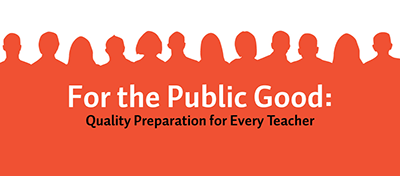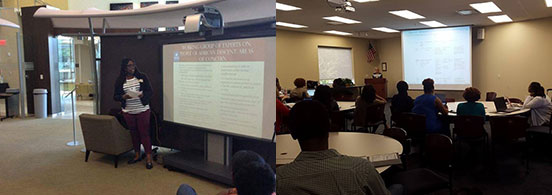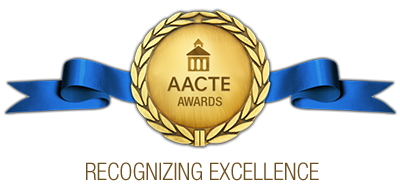19 Jul2016
By Mark LaCelle-Peterson
Assessment matters for teachers. Teachers target and differentiate instruction based on evidence gathered in classroom assessments. Teams of teachers in schools review assessment evidence to understand student needs and to guide curriculum development. Parents, teachers, and students themselves make use of assessment results to make the most of learning opportunities. Assessment and interpretation of assessment results is also sometimes a particular challenge for novice teachers, and it is often the subject of school and district professional development efforts. With so many tests, so many strategies, and so much evidence, assessment is a wide and sometimes confusing topic.
15 Jul2016
By AACTE Committee on Professional Preparation and Accountability
The annual AACTE call for award nominations is currently open. As members of the AACTE Committee on Professional Preparation and Accountability, we have the honor of overseeing the three Professional Achievement Awards. Please take a moment to nominate someone deserving for the 2017 Margaret B. Lindsey Award, David G. Imig Award, or Edward C. Pomeroy Award.
These awards honor individuals who have made a meaningful contribution to our profession with their research, policy leadership, or other service to the community. Certainly, you know someone whose tremendous impact on educator preparation deserves recognition. We hope you will take a moment to help us develop a robust pool of nominees for these awards:
11 Jul2016
By Kristin McCabe
A new report on international approaches to developing elementary teachers will be released next week at a webcast event featuring AACTE President/CEO Sharon P. Robinson. Register at this link to tune in for the event, which will be held Tuesday, July 19, 10:00 – 11:30 a.m. EDT.
The report, Not So Elementary: Primary School Teacher Quality in Top-Performing Education Systems, is authored by Australian researcher Ben Jensen on behalf of the National Center on Education and the Economy (NCEE). It looks at international practices in elementary teacher preparation and their effects on student achievement. Recommendations for U.S. policy and practice are included.
11 Jul2016
By Mark LaCelle-Peterson
 Ask any new teacher what part of their preparation was most important, and the answer will almost always be the final clinical component—the student teaching, internship, or residency experience. But while everyone seems to agree that high-quality clinical experience is critical to high-quality preparation, a persistent set of challenges have stood in the way of widespread implementation: identifying excellent clinical faculty, providing adequate time in clinical placements, and helping candidates, particularly those of limited means, navigate the full-time demands of unpaid student teaching or internships.
Ask any new teacher what part of their preparation was most important, and the answer will almost always be the final clinical component—the student teaching, internship, or residency experience. But while everyone seems to agree that high-quality clinical experience is critical to high-quality preparation, a persistent set of challenges have stood in the way of widespread implementation: identifying excellent clinical faculty, providing adequate time in clinical placements, and helping candidates, particularly those of limited means, navigate the full-time demands of unpaid student teaching or internships.
30 Jun2016
By Terrance McNeil
The views expressed in this post do not necessarily reflect the views of AACTE.
As practitioners in the field, we know that great things are happening every day in teacher preparation and school leadership. We are also keenly aware of some of the statistics revealed in the recent report of data collected by the U.S. Department of Education’s Office of Civil Rights. The results are disconcerting, and as Secretary John King articulated, reveal the necessity for continued attention to this issue.
28 Jun2016
By Zachary VanHouten
Last week the National Council on Teacher Quality (NCTQ) released a new report offering the council’s assessment of how well teacher preparation programs are preparing preschool educators. Again relying on course descriptions and syllabi for its evidence, NCTQ paints a predictably bleak picture, saying the “review of these programs shows little evidence of quality training focused on the needs of the preschool classroom.”
For this report, NCTQ reviewed 100 programs in 29 states and chose not to identify which programs were included in the review. Accompanying the report is a set of resources that include policy recommendations for states and school districts, outlining what NCTQ calls “essentials for a great preschool teacher prep program,” and a guide for would-be teachers, outlining what NCTQ believes they should look for in a teacher prep program.
27 Jun2016
By Deborah Koolbeck
The National Commission on Financing 21st Century Higher Education released a set of white papers earlier this month exploring aspects of the fiscal issues facing higher education. Designed to guide policy and funding decisions, these papers (and another six still in development) provide a revealing look at the state and national funding landscape for institutions.
The commission, a project of the University of Virginia’s Miller Center, has been working since 2014 on policy and funding recommendations for the United States to reach the goal of 60% of the labor workforce having a postsecondary degree or credential by 2025. Currently, the nation is not on target to meet this goal and faces numerous related challenges, from high school graduation rates and access to higher education to workforce underdevelopment. According to the Organization for Economic Cooperation and Development, other nations are meeting or surpassing the United States in postsecondary degree and credentialing rates.
27 Jun2016
By Jerrica Thurman
The TeachNY Advisory Council, convened last year by the State University of New York (SUNY), published last month a set of recommendations to address the most pressing challenges facing the state’s teacher development pipeline. The dozens of policy recommendations and innovative strategies for teacher recruitment, preparation, and career support are now providing a roadmap for a collaborative campaign between SUNY and the New York State Education Department (NYSED).
“If we take our 60 recommendations and the really hot buttons that we’re talking about right now in terms of policy and execution, and we take them to scale across the SUNY system, we will do good for New York,” said SUNY Chancellor Nancy Zimpher in an interview with The Chronicle of Higher Education. What’s more, Zimpher said, the system hopes to “work with other states and with other policy makers, too, to take what we’re learning across the country.”
21 Jun2016
By Yupin Bae and Michelle Kotek
Editor’s note: This is the fourth of six blogs exploring data on program entry and exit requirements from the latest available (2014) federal collection mandated by Title II of the Higher Education Act. The data include 1,497 providers of “traditional” programs based in institutions of higher education (IHEs), 472 providers of IHE-based alternative programs, and 201 providers of non-IHE-based alternative programs.
In this article, we look at the frequency of various program completion requirements among three types of providers at the undergraduate and graduate levels. (See our recent blogs about the number and frequency of various entry criteria and the number of exit criteria used by these three categories of providers.)
14 Jun2016
By Kristin McCabe
A new study finds that using observational ratings of beginning teachers may be a viable alternative—or a useful complement—to relying solely on controversial “value-added” modeling (VAM) in evaluation of educator preparation providers (EPPs).

 An article about the study by Matthew Ronfeldt and Shanyce Campbell of the University of Michigan School of Education, published in the journal Educational Evaluation and Policy Analysis, is now available online.
An article about the study by Matthew Ronfeldt and Shanyce Campbell of the University of Michigan School of Education, published in the journal Educational Evaluation and Policy Analysis, is now available online.
In what the authors describe as the first study to investigate the use of teachers’ observational ratings to evaluate their preparation programs and institutions, the results are compelling.
“The demands for teacher preparation accountability continue to grow, from the proposed federal regulations to new accreditation standards,” said Ronfeldt, who was also the 2016 recipient of AACTE’s Outstanding Journal of Teacher Education Article Award. “We sorely need better ways to assess program quality. Although VAM makes an important contribution to our understanding of program outcomes, we likely need multiple measures to capture something as complex as preparation quality. We are excited to find that teacher observational ratings could be a viable supplement.”
13 Jun2016
By Yupin Bae and Michelle Kotek
Editor’s note: This is the third of six blogs exploring data on program entry and exit requirements from the latest available (2014) federal collection mandated by Title II of the Higher Education Act. The data include 1,497 providers of “traditional” programs based in institutions of higher education (IHEs), 472 providers of IHE-based alternative programs, and 201 providers of non-IHE-based alternative programs.
Although critics sometimes claim that educator preparation programs have few or no requirements for admission and completion, federal Title II data say otherwise. In this article, we explore the number of exit requirements reported by different types of providers at the undergraduate and graduate levels. (See our recent blogs about the number and frequency of various entry requirements.)
As noted in the first blog of our series, the Title II survey provides 15 options for providers to indicate their entry and exit criteria:
13 Jun2016
By Francisco X. Gaytán
When considering the trends in college degree attainment among students of color, there appears to be a tale of two genders, and something must be done about it. In April, I was part of a group of educators from across the country that convened in New Jersey at William Paterson University’s College of Education to consider the issue. The attendees have been working together over the past 2 years as members of AACTE’s Black and Hispanic/Latino Male Initiative Networked Improved Community (NIC), drawing upon the collective expertise of the member institutions to increase representation of Black and Hispanic/Latino males in the teacher workforce.
09 Jun2016
By Whitney Watkins

The annual Holmes Scholars Dissertation Symposium and Retreat convened May 27-28 at the University of Central Florida (UCF) in Orlando. The retreat served as an invaluable exchange of knowledge, mentorship, and networking. Professionals in the fields of counseling and mentoring, qualitative research, quantitative research, and grant writing guided more than 70 participants in their doctoral journeys.
09 Jun2016
UPDATE: Submission deadline for Best Practice and Professional Achievement Awards has been extended to October 26
By Kristin McCabe
 Nominations for all of the 2017 AACTE awards are now open on AACTE’s online submission site. To read detailed submission information, please refer to the official Call for Entries.
Nominations for all of the 2017 AACTE awards are now open on AACTE’s online submission site. To read detailed submission information, please refer to the official Call for Entries.
Now in its 21st year, AACTE’s awards program recognizes member institutions’ exemplary programs as well as individuals who have made noteworthy contributions to education preparation. For an overview of last year’s winners, see this press release.
23 May2016
By JTE Insider
Have you seen the JTE Insider blog managed by the Journal of Teacher Education editorial team? Check out the latest entry below.
In the editorial of the May/June 2016 issue of the Journal of Teacher Education, Carter Andrews, Bartell, and Richmond bring awareness to the recent teacher sick-outs in Detroit Public Schools as a way to illustrate the continued resistance to elements that serve to dehumanize the teaching profession. They write:
We are calling attention to the teacher sick-outs in Detroit and the factors leading up to them in these pages, because they represent one of the numerous examples throughout the country of educators’ resistance to the continued de-professionalization of teachers and teaching and the institutional and structural forms of dehumanization that teachers experience regularly. Furthermore, we believe teachers’ professional self-concept is negatively impacted by inequitable working conditions in many high-need schools and communities that are not present in schools that are resource-rich. (p. 170)







 Ask any new teacher what part of their preparation was most important, and the answer will almost always be the final clinical component—the student teaching, internship, or residency experience. But while everyone seems to agree that high-quality clinical experience is critical to high-quality preparation, a persistent set of challenges have stood in the way of widespread implementation: identifying excellent clinical faculty, providing adequate time in clinical placements, and helping candidates, particularly those of limited means, navigate the full-time demands of unpaid student teaching or internships.
Ask any new teacher what part of their preparation was most important, and the answer will almost always be the final clinical component—the student teaching, internship, or residency experience. But while everyone seems to agree that high-quality clinical experience is critical to high-quality preparation, a persistent set of challenges have stood in the way of widespread implementation: identifying excellent clinical faculty, providing adequate time in clinical placements, and helping candidates, particularly those of limited means, navigate the full-time demands of unpaid student teaching or internships. 
 An article about the study by Matthew Ronfeldt and Shanyce Campbell of the University of Michigan School of Education, published in the journal Educational Evaluation and Policy Analysis, is now
An article about the study by Matthew Ronfeldt and Shanyce Campbell of the University of Michigan School of Education, published in the journal Educational Evaluation and Policy Analysis, is now 
 Nominations for all of the 2017 AACTE awards are now open on
Nominations for all of the 2017 AACTE awards are now open on